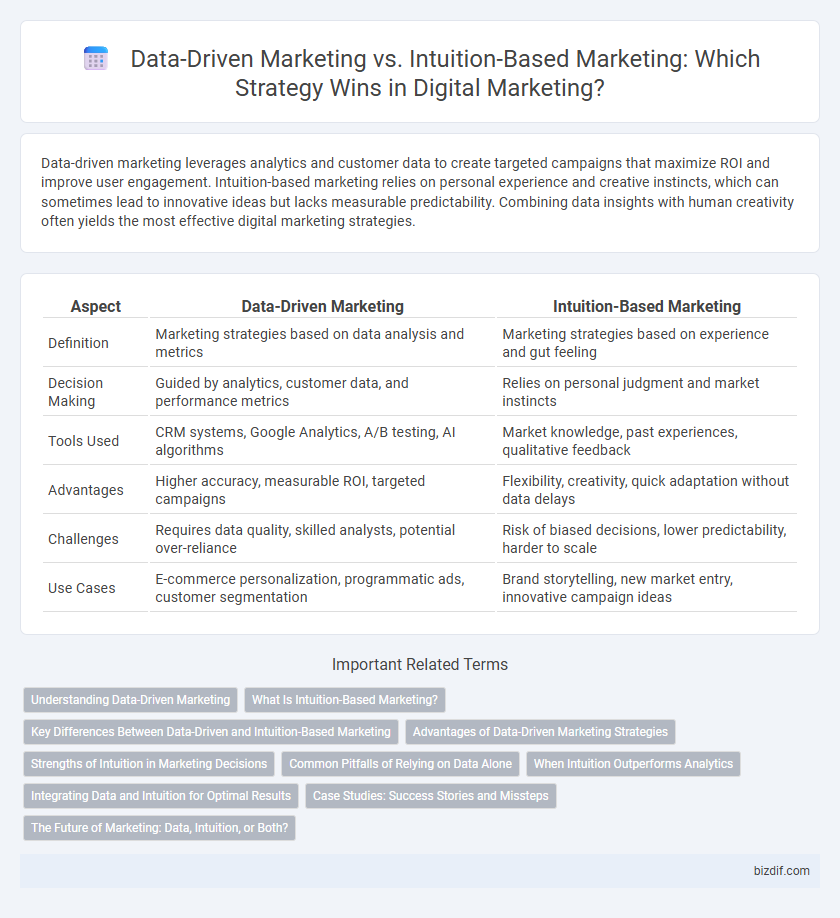Data-driven marketing leverages analytics and customer data to create targeted campaigns that maximize ROI and improve user engagement. Intuition-based marketing relies on personal experience and creative instincts, which can sometimes lead to innovative ideas but lacks measurable predictability. Combining data insights with human creativity often yields the most effective digital marketing strategies.
Table of Comparison
| Aspect | Data-Driven Marketing | Intuition-Based Marketing |
|---|---|---|
| Definition | Marketing strategies based on data analysis and metrics | Marketing strategies based on experience and gut feeling |
| Decision Making | Guided by analytics, customer data, and performance metrics | Relies on personal judgment and market instincts |
| Tools Used | CRM systems, Google Analytics, A/B testing, AI algorithms | Market knowledge, past experiences, qualitative feedback |
| Advantages | Higher accuracy, measurable ROI, targeted campaigns | Flexibility, creativity, quick adaptation without data delays |
| Challenges | Requires data quality, skilled analysts, potential over-reliance | Risk of biased decisions, lower predictability, harder to scale |
| Use Cases | E-commerce personalization, programmatic ads, customer segmentation | Brand storytelling, new market entry, innovative campaign ideas |
Understanding Data-Driven Marketing
Data-driven marketing leverages analytics, customer insights, and real-time data to tailor campaigns, optimize targeting, and measure effectiveness with precision. It relies on tools such as CRM systems, predictive algorithms, and performance metrics to enhance decision-making and ROI. This approach contrasts with intuition-based marketing by emphasizing evidence over gut feelings, enabling marketers to adjust strategies based on quantifiable trends and consumer behavior patterns.
What Is Intuition-Based Marketing?
Intuition-based marketing relies on marketers' experience, instincts, and subjective judgments rather than on structured data analysis, enabling rapid decision-making in uncertain or novel situations. This approach leverages creativity and gut feelings to anticipate consumer behavior, often useful when data is incomplete or unavailable. Despite its reliance on personal insight, intuition-based marketing carries the risk of bias and less measurable outcomes compared to data-driven strategies.
Key Differences Between Data-Driven and Intuition-Based Marketing
Data-driven marketing relies on analytics, customer data, and measurable metrics to craft targeted campaigns, ensuring precision and ROI optimization. Intuition-based marketing depends on experience, creativity, and gut feelings, often leading to trial-and-error outcomes without quantifiable evidence. Key differences include data dependency, decision-making processes, and the ability to track and adjust strategies in real-time.
Advantages of Data-Driven Marketing Strategies
Data-driven marketing strategies leverage analytics, customer data, and real-time insights to optimize campaign targeting, resulting in higher conversion rates and improved ROI. By using precise metrics and performance data, businesses can tailor personalized content and allocate budgets efficiently, reducing wasteful ad spend. This approach enhances decision-making accuracy and adapts quickly to market trends compared to intuition-based marketing, which relies on subjective judgment and experience.
Strengths of Intuition in Marketing Decisions
Intuition-based marketing leverages marketers' deep industry experience and creative insight to make agile decisions in rapidly changing market conditions. This approach enables the identification of subtle trends and emotional connections that data alone may overlook, fostering authentic brand engagement. Relying on intuition can accelerate decision-making processes by bypassing data analysis, which is particularly valuable in emerging markets with limited data availability.
Common Pitfalls of Relying on Data Alone
Relying solely on data-driven marketing can lead to overlooking the human element, causing campaigns to miss emotional connections with the audience. Data analytics may reveal patterns but can fail to capture market nuances, resulting in rigid strategies that lack creativity and adaptability. Ignoring context and intuition risks misinterpreting data signals, leading to misguided targeting and wasted budgets in digital marketing efforts.
When Intuition Outperforms Analytics
Intuition-based marketing outperforms data-driven approaches in rapidly changing markets where historical data lacks relevance or in creative campaigns requiring emotional resonance. Experienced marketers leverage innate understanding and real-time context to make agile decisions beyond the scope of analytics. This human insight captures nuanced consumer behaviors and emerging trends that algorithms may overlook or misinterpret.
Integrating Data and Intuition for Optimal Results
Integrating data-driven marketing with intuition-based strategies enhances campaign effectiveness by combining quantitative insights with experiential judgment. Leveraging analytics tools to interpret consumer behavior enables marketers to make informed decisions while using intuition to adapt creatively to market dynamics. This hybrid approach maximizes return on investment by balancing statistical evidence with expert intuition in digital marketing strategies.
Case Studies: Success Stories and Missteps
Data-driven marketing leverages analytics and concrete metrics to optimize campaigns, as demonstrated by Amazon's personalized recommendation system boosting sales by 29%. In contrast, intuition-based marketing relies on creativity and experience, which led Pepsi's 2017 ad to face backlash due to misjudged cultural tones. Case studies reveal that integrating data insights with human creativity often yields higher ROI and fewer public relations missteps.
The Future of Marketing: Data, Intuition, or Both?
The future of marketing hinges on the integration of data-driven insights and intuition-based strategies to optimize campaign effectiveness and customer engagement. Harnessing big data analytics enables marketers to predict trends, personalize content, and measure ROI with precision, while seasoned intuition taps into creativity and contextual understanding that relies on human experience. Combining data science with intuitive judgment creates a dynamic approach that maximizes both accuracy and innovation in digital marketing efforts.
Data-driven marketing vs Intuition-based marketing Infographic

 bizdif.com
bizdif.com